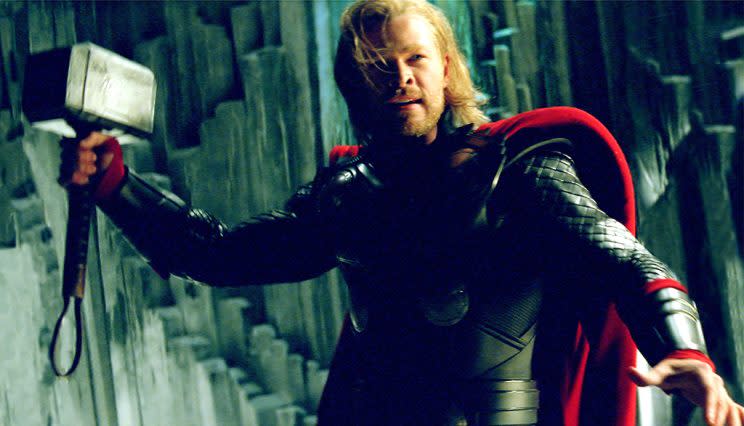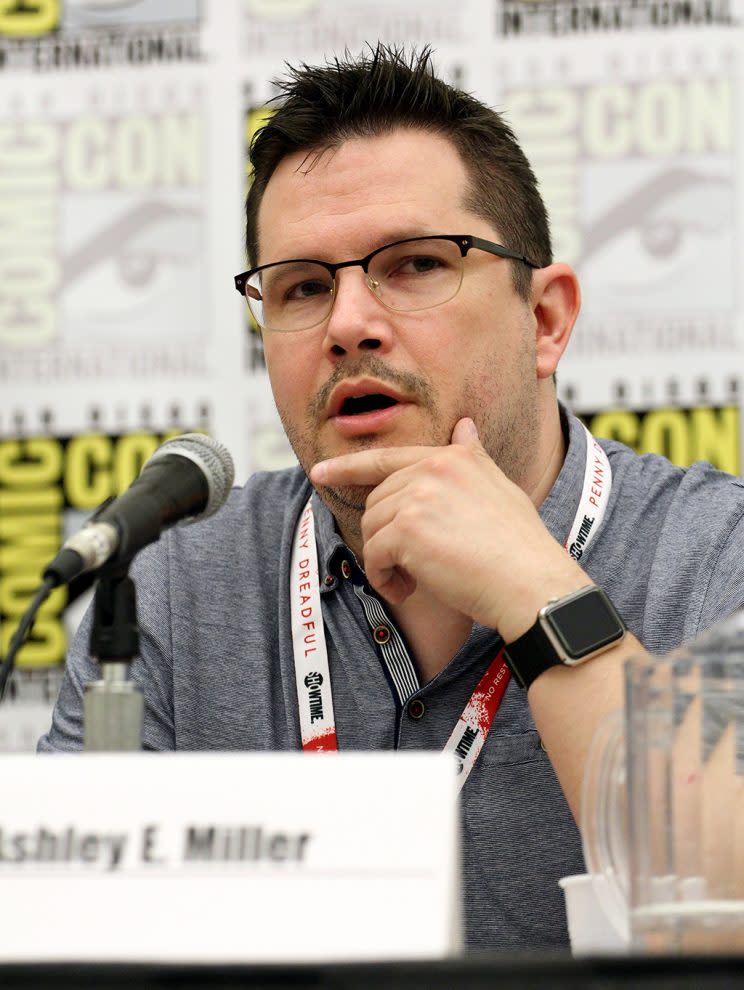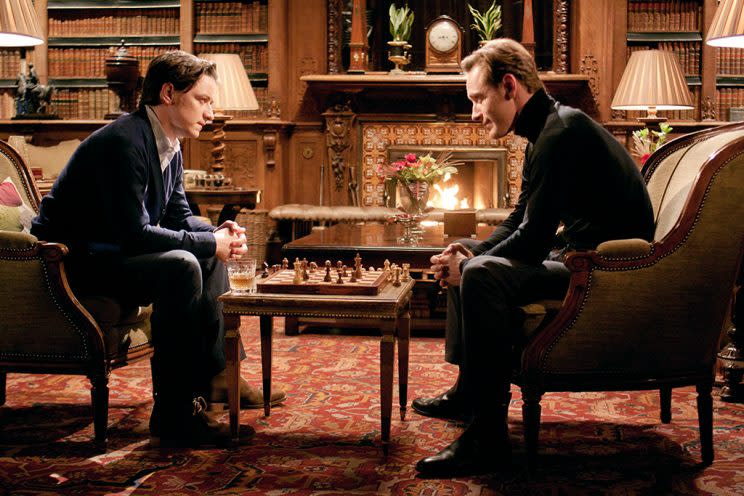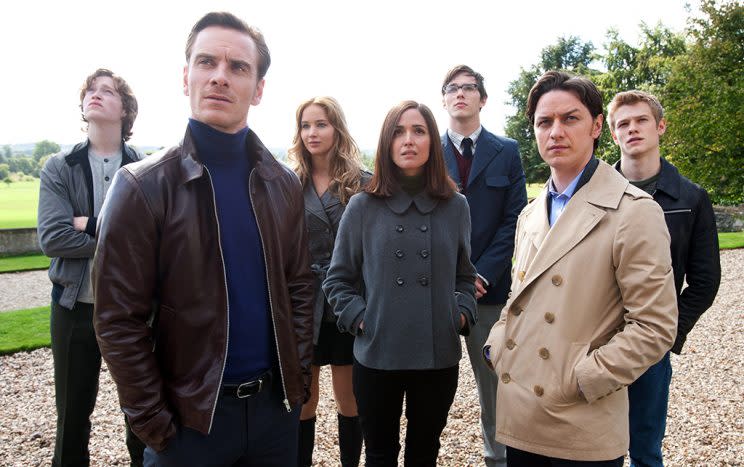Screenwriter Ashley Miller Talks Comic-Book Movies: "There Can Be Jokes in 'Thor,' But Thor Can't Be a Joke"

Wanna know how Hollywood’s superhero sausage is made? Just ask a screenwriter. For the new book, On Story — Screenwriters and Filmmakers on Their Iconic Films, the Austin Film Festival gathered a trio of experienced comic-book movie scribes for a freewheeling panel discussion of the ins and outs of creating these giant-sized spectacles: Michael Green (Green Lantern); Nicole Perlman (Guardians of the Galaxy); and Ashley Miller, who is in the unique position of having worked on both the inaugural Thor adventure for Marvel Studios, as well as X-Men: First Class for 20th Century Fox’s stand-alone X-verse. We spoke with the 45-year-old Miller about jumping between those universes, and how he conceived of First Class as a “historical bromance.”
There’s been a lot of speculation about the different ways that Marvel and Fox operate in regard to their comic book properties. What was your experience?
The most important thing to remember is that Marvel has a ton of properties, while Fox’s bread and butter in the superhero movie business is the X-Men. So when you play in [Fox’s] sandbox, you’re playing in the entire sandbox, as opposed to Marvel where you’re working in one corner of their sandbox. Also, Marvel releases two movies a year, while Fox releases one X-Men movie every two years, so the risks are higher. There’s a lot riding on every single X-Men film.

Fox’s handling of the X-verse has earned them a lot of fanboy criticism over the years. Fair or unfair?
I see it this way: Depending on how you count them, Fox has made around nine X-Men movies, and at least four have been truly great. That’s a batting average of around 50 percent, which most franchises would kill for. Now, not everything has been as creatively successful as X2 or First Class or Deadpool, which you’ve gotta count as an X-Men movie. But not everything has to be: When you’re scoring home runs 50 percent of the time and otherwise solid doubles or the occasional whiff à la The Last Stand, I think you’re doing all right. And between Deadpool and Legion, which is coming to the FX cable network, they’re starting to explore the universe they have available to them.
One of the most common complaints from fans about the X-Men franchise involves the continuity discrepancies that crop up between movies. You mention in On Story how with First Class you adopted a “Nothing to see here, keep moving” attitude to continuity. Is this something fans just have to get over?
I don’t think things have to be perfect, but they do have to be consistent. You have to stay true to the core events, ideas, and understanding of the characters we’re watching on screen, because the audience expects that. I don’t think they sweat the small stuff for the most part. First and foremost, they want dramatic and narrative continuity within the movie they’re watching. On the other hand, there’s a small number of fans for whom the small details are hugely important, and it’s important they line up.
I throw this challenge out at panels: Take 100 people and ask them each to tell you the story of the first Star Wars. You’ll get 100 different answers about how that plot goes. People will be quoting dialogue from the wrong movie and assigning it to Star Wars. It’s just not how we remember stuff. We have an emotional experience and it has to be consistent. If something knocks us out of that, we don’t forgive it.

You remark in the book how you approached First Class as a “historical bromance” between the young Professor X and Magneto, and that became your way into the story. That was a notable departure from the X-Men movies up to that point — where Wolverine had been the primary point of view character — and it gave First Class a distinct personality from its predecessors. If anything, the latter sequels, Days of Future Past and Apocalypse, suffered from not having a clearly defined central character. Would [establishing point of view] be your advice for whatever direction the X-verse takes next?
One of the problems with sequels is that when you make a movie, it’s supposed to be the biggest, most important thing that’s every happened to a character. So how do you do that again in a sequel? When you have an ensemble cast, the opportunity is there for you to look at things through a different lens.
First Class benefitted from the fact that both Professor X and Magneto were somewhat removed from the events of the first three movies. Not that they weren’t hugely important characters, but the audience wasn’t inside their point of view. So being able to do that with First Class gave that film a very different identity from the others. And arguably, Apocalypse is Mystique’s movie, which I think is to its benefit. Going forward, the X-Men movies — like any ensemble movie — is going to want to find the point of view that’s different in order to tell a story.

Turning to Thor, that movie represented a pivotal moment in the evolution of the Marvel Cinematic Universe. Did you feel that pressure at the time?
There’s a lot of pressure on any movie, but that was a very important film to them in terms of setting up The Avengers and making the audience feel that the concept was going to work. The tone was very different, and we had to resolve the apparent discrepancy of the high-tech, sci-fi world of Iron Man and the fantasy world of Thor. We had to make Thor feel like he existed in the same universe as Iron Man. Making sure that movie felt like it was part of a universe, but also being able to stand alone as a film, was a part of every conversation.
Striking that balance between a standalone film and an installment in an ongoing universe is a challenge Marvel has faced ever since Thor. It’s an approach that could be likened to episodic television as opposed to feature filmmaking.
As Marvel has achieved this enormous success, that certainly seems to be the mind-set. At the same time, I have to credit them for remembering that every movie has to work as a movie. And it’s difficult to find an example of a Marvel movie that doesn’t work on its own terms. Making references to the wider universe — like we did in Thor with Hawkeye and Agent Coulson — are just candy to me. We were just having fun with it. That was more about seizing the opportunity than thinking about big picture.
With scene-stealing roles in movies like Vacation and Ghostbusters, Chris Hemsworth has revealed himself to be a great comic actor. It’s worth remembering that he’s quite funny as Thor as well. How much of that comedy was already in the script, and how much did you add after you saw what he was capable of?
When we were writing that movie, nobody knew who Thor was going to be. And when we got under way, no one had a sense of how great Chris would be except for director Kenneth Branagh, who clearly saw the talent in that man. What’s great about Chris’s performance is that he brings humor and charm to it, but also this weight and gravity. He has to bring that gravity or Thor doesn’t work. There can be jokes in Thor, but Thor can’t be a joke.
Chris Hemsworth shares video from the set of ‘Thor: Ragnarok’:


